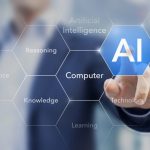Accountants are embracing artificial intelligence

Despite the popular belief that artificial intelligence is coming to take your jobs away, accountants would love some robotic help to get them through the day. This is according to a new report by Sage, which says 96 percent of accountants are confident about the future of accountancy as well as their role in it.
Despite welcoming change, more than two thirds of respondents (68 percent) expect their roles to change through automation, in the future.
Ghost in the Shell: How much can it get right?

The new Hollywood sci-fi blockbuster Ghost in the Shell imagines 2029, a world where cyber terrorists hack into people’s digitally enhanced minds and where cyborgs have crises of identity. So, how much has it got right? Is this the future?
Should we be concerned that our cybernetic development, already constantly on-boarding new connected technology, will reach a point where our brains become both infected and controlled by rabid self-willed robots? Well, probably not just yet. But the question is there -- should we countenance such a dystopian scenario? Of course we should.
AI and Humans: Focusing on what we can achieve together

Dystopian fever spiked again last week as PwC issued a report predicting UK jobs carnage at the hands of robots over the coming decade. "Artificial Intelligence" has dark overtones in the media and the popular imagination. Some of us are buzzed about this new era of augmented human performance and meaningful human computer interactions. Others worry for their livelihoods, even their personal freedoms.
AI technology has improved significantly over the last few years, mainly because of a combination of a huge increase in the availability of data and cheap computation. This means that AI researchers now have meaningful amounts of "training data" to train their models and the computational power needed to run complex learning approaches. The sudden acceleration of AI performance is a thrilling development for data scientists, and great seed material for ominous sci-fi and gloomy consultancy forecasts.
What challenges do Industrie 4.0 projects face?

Algorithms are at the heartbeat of Industrie 4.0 projects, according to Gartner, and that’s going to result in 30 percent of Industrie 4.0 projects sourcing algorithms from leading algorithm marketplaces by 2020.
That means a jump of less than five per cent, compared to what we currently have in the market.
Business 2020: A clear and connected vision for the future

According to Walker Information’s Customers 2020 Report, by the year 2020, customer experience will be the number one competitive differentiator for brands. With just three years to go, brands still have some work to do to get smarter about their customers, and to learn how to quickly keep pace with the numerous technology changes ahead.
From smart technology, artificial intelligence and multi-channel customer communication, technology continues to evolve at a rapid pace. As devices, customers and companies become even more connected, prioritization is the key to customer experience success. Here are five ways brands can stay ahead of the 2020 curve.
Microsoft and Nvidia unveil HGX-1 hyperscale GPU accelerator

Blueprints for a new hyperscale GPU accelerator have been introduced recently, jointly by Microsoft and NVIDIA. The two companies are saying the accelerator would "drive AI cloud computing."
The accelerator is called HGX-1 hyperscale GPU. It is released in conjunction with Microsoft’s Project Olympus, as an open-source design.
Using technology to fight climate change

2016 was the warmest year on record -- around 1.2 degrees C warmer than pre-industrial levels to be exact. Whilst this doesn’t sound very much, evidence has already shown that an average rise of 1 degree C across the whole of the Earth’s surface would result in huge changes to the climatic extremes we see today.
Meanwhile, our forests and oceans aren’t faring much better. The significant decline of the planet’s rainforest has been documented throughout my lifetime and, according to a report last year by the Ellen MacArthur Foundation, by 2050 there could be more plastic by weight in our oceans than fish. Add to this the recent findings that the Earth is on track to lose two-thirds of its wildlife by 2020 and it’s easy to see that we are already in a pretty dire state.
Embracing the possibilities of artificial intelligence

We have seen a machine master the complex game of Go, previously thought to be one of the most difficult challenge of artificial processing. We have witnessed vehicles operating autonomously, including a caravan of trucks crossing Europe with only a single operator to monitor systems. We have seen a proliferation of robotic counterparts and automated means for accomplishing a variety of tasks. All of this has given rise to a flurry of people claiming that the AI revolution is already upon us.
However, while there is no doubt that there have been significant advancements in the field of AI, what we have seen is only a start on the path to what could be considered full AI.
Tech reporting is more negative now than in the past

I like to think that while I do certainly criticize technology products and technology companies for any failings -- Microsoft forcing Windows 10 on to customers against their will last year, for example -- I’m fair. I still get as excited about a new phone, or a new version of Windows, as I did in the past, and I don't deliberately look for negatives. The same is true for all other BetaNews writers.
However, a new study finds that tech reporting is generally more pessimistic now than in the past, and for two very different reasons.
Five major changes coming to the tech world

Technology in the workplace is developing at a blistering rate. Both consumer tech and uniquely business-orientated innovations are completely changing the working environment, from the boardroom to the basement. Many innovations, such as company-wide instant messaging are now the norm, but we want more. We want our environment and our appliances to think with us; keep our calendars, book our holidays and take care of our daily routine -- and new technologies are being developed every day to help us achieve this.
The year ahead will undoubtedly bring about change and progress towards this future. Below are five innovations that are at the moment in their infancy, but will have a drastic impact over the next year:
Smart machines will become mainstream in the enterprise by 2021

If Gartner’s right, smart machines will become a business mainstream by 2021. Its new report, entitled "Smart Machines: Consulting and System Integration Services Market Forecast and Opportunities", says smart machines will see a 30 percent adoption in the next five years among large enterprises.
Gartner says cognitive computing, artificial intelligence (AI), intelligent automation, machine learning and deep learning are all considered "smart machines". By becoming mainstream, smart machines will open up an entirely new industry, which is expected to be worth approximately $29 billion (£23.3bn) by 2021.
Many CEOs believe technology will make people 'largely irrelevant'

Although artificial intelligence (AI), robotics and other emerging technologies may reshape the world as we know it, a new global study has revealed that the majority of CEOs now value technology over people when it comes to the future of their businesses.
The study was conducted by the Los Angeles-based management consultant firm Korn Ferry that interviewed 800 business leaders across a variety of multi-million and multi-billion dollar global organizations. The firm says that 44 percent of the CEOs surveyed agreed that robotics, automation and AI would reshape the future of many work places by making people "largely irrelevant".
Mesh Networking: An alternative internet?

Currently, in order to exchange information on a computer or smartphone, we transfer it over the internet. This may take many different forms -- a web browser, email client, app or cloud storage -- but at the end of the day, you’re sending packets of information to another computer via the now-ubiquitous internet. Since we interact with this system all of the time, we no longer think about "going online". For many people, it’s just a natural state.
If you step back a little bit, you’ll remember that the internet isn’t the only way to transfer computer information. Disks, CDs and other physical media once dominated this space, and the term "sneakernet" was even coined to refer to physically transferring media from place to place. There were phone-based communication systems known as bulletin boards (BBSes), and larger endeavors like America Online or CompuServe, which used phone modems. These were limited to a maximum of 56 kilobits per second (kbps) over telephone lines and had a limited number of simultaneous users.
What you need to know about smart cities

Imagine living somewhere where traffic jams were a thing of the past, where ambulance crews started on-route to an emergency before anyone had dialed 911 and where critical infrastructure operated at maximum efficiency. This utopian city may not currently be possible, but the Internet of things could change that in the not too distant future.
By connecting various aspects of the urban landscape to the Internet, local administrators will gain access to countless extra data sets that could help them provide better services for their citizens. These smart cities not only promise to improve the lives of their inhabitants, but also provide potentially lucrative commercial opportunities for a number of businesses.
What you need to know about artificial intelligence

Artificial intelligence (AI) has quickly become a hot topic in the last couple of years, thanks primarily to the rapid progression of software and the development of new and exciting (or new and scary, depending on your view) technologies.
Movies and TV have long made us aware of the potential of AI, but many of the seemingly farfetched ideas are now closer to becoming a reality. And, as investment continues to grow, so too will the interest and success of such projects.
Recent Headlines
Most Commented Stories
BetaNews, your source for breaking tech news, reviews, and in-depth reporting since 1998.
Regional iGaming Content
© 1998-2025 BetaNews, Inc. All Rights Reserved. About Us - Privacy Policy - Cookie Policy - Sitemap.